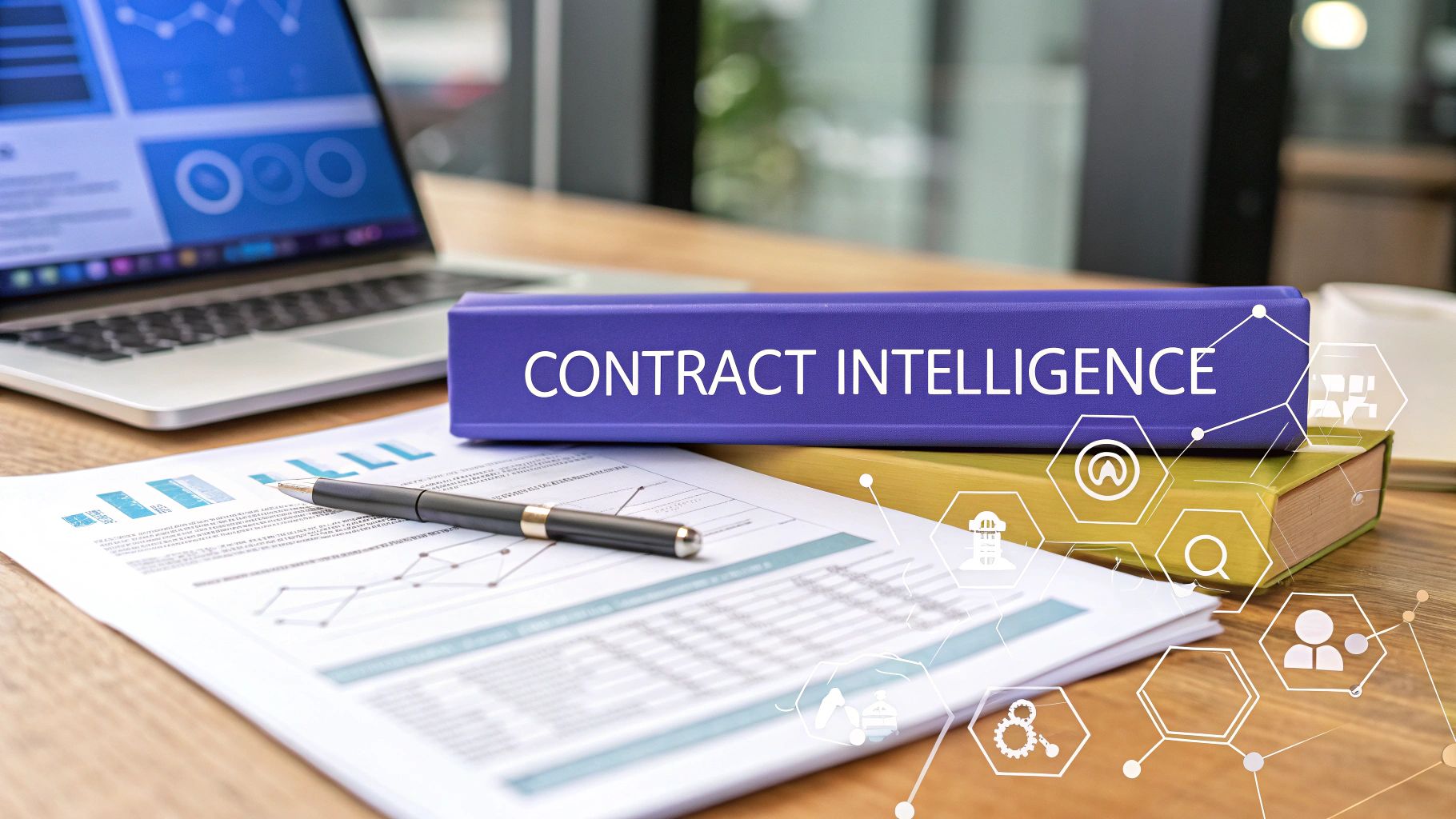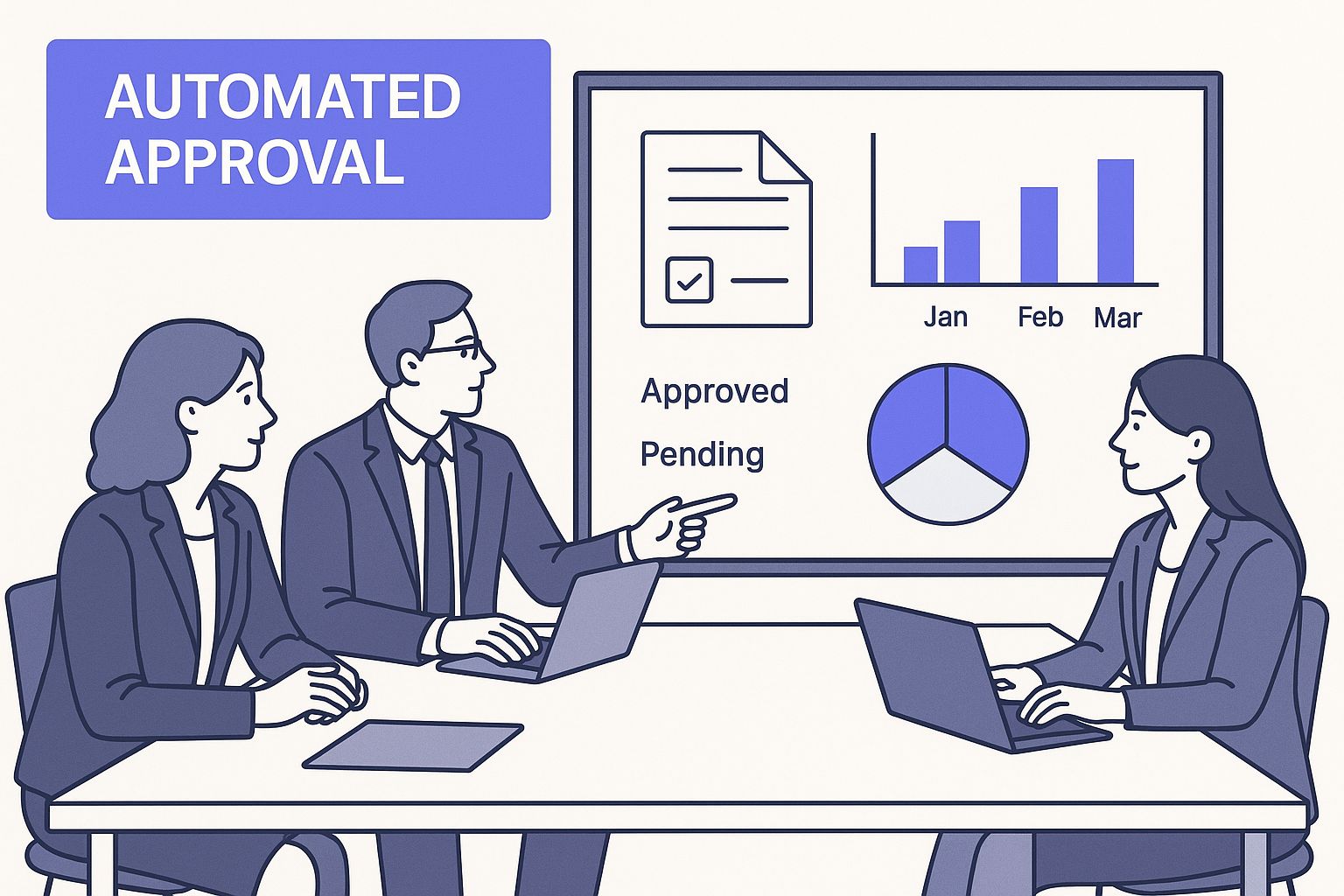
The Evolution From Paper to Intelligence

Contract management has changed drastically. For years, it involved physical documents, filing cabinets, and the risk of missed deadlines or lost agreements. This manual system wasn't just inefficient, it was also error-prone, costing businesses time and money. Reliance on paper created bottlenecks that slowed growth and strategic planning.
The arrival of digital technology started to change things. Early contract management software solutions offered digitization, moving businesses from physical storage to searchable databases. This was a key first step toward real innovation. Contracts became easier to access, but many processes remained manual.
This is where Artificial Intelligence (AI) comes in. AI in contract management is more than just automation. It's about making contracts dynamic sources of information. The use of AI in contract management is growing rapidly, with a 30% increase in organizations adopting AI-powered processes by 2025.
This growth shows the strategic importance of AI in managing contracts, especially for tasks like clause identification, contract drafting, and ensuring compliance. Legal professionals anticipate a significant AI-driven change in contract management in the next three years. In fact, 70.8% of those surveyed expect this shift. The goal is not just automation, but using contracts to gather business intelligence. Find more detailed statistics here This transforms contracts from administrative burdens into valuable assets.
Key Milestones in the Evolution of Contract Management
- Paper-Based Systems: Manual processes, high risk of errors, and inefficient workflows.
- Early Digitization: Introduction of contract management software, improved accessibility, and searchability.
- AI Integration: Automation of key tasks, improved accuracy, and extraction of business intelligence.
AI integration has revolutionized the field. Think of it as the difference between a horse-drawn carriage and a self-driving car. Both provide transportation, but the latter offers speed, efficiency, and a wealth of data. Likewise, AI-powered contract management automates tedious tasks and provides valuable insights for better decisions. This has placed contract management at the forefront of strategic business operations.
Game-Changing Benefits Beyond Simple Automation

The infographic above shows a team working together on contract approvals. It highlights how AI can make this process much smoother. This visual demonstrates how AI-powered contract management helps approvals move seamlessly, leading to quicker decisions. This allows legal professionals to focus on more strategic tasks.
Efficiency and Accuracy: A New Standard
Switching from manual contract management to AI solutions brings big improvements in efficiency and accuracy. AI can review a contract in just 26 seconds, compared to the 92 minutes it takes a person. This speed allows for faster turnarounds and quicker decisions. AI solutions can also cut contract lifecycle time by up to 39% and boost productivity by 44%. Find more detailed statistics here This frees up legal teams to work on strategic projects and complex legal matters, instead of administrative tasks.
Enhanced Risk Management and Compliance
AI in contract management not only improves efficiency, but also strengthens risk management and compliance. AI algorithms can quickly find risky clauses and ensure compliance with regulations across different regions. This proactive approach helps avoid costly legal battles and maintains strong compliance. For instance, AI can flag clauses that don't follow company policies or identify potential conflicts of interest. This allows legal teams to address these issues early on.
The following table summarizes the key differences between traditional and AI-powered contract management:
AI vs. Traditional Contract Management Comparison A comparison of key metrics between traditional manual contract management and AI-powered contract management solutions
| Metric | Traditional Process | AI-Powered Process | Improvement |
|---|---|---|---|
| Contract Review Time | 92 minutes | 26 seconds | >99% |
| Contract Lifecycle Time | Variable | Reduced by up to 39% | Up to 39% |
| Productivity | Variable | Increased by up to 44% | Up to 44% |
| Risk Identification | Manual, time-consuming | Automated, real-time | Significant |
| Compliance Monitoring | Manual, prone to errors | Automated, consistent | Significant |
As the table shows, AI-powered contract management significantly improves key metrics, allowing for greater efficiency and reduced risk.
From Liability to Strategic Asset
AI changes your contract repository from a static archive into a dynamic, searchable database. Organizations can use AI-powered analytics to find trends, track obligations, and better understand their contracts. This information can improve negotiation strategies, optimize spending, and find new business opportunities. Learn more in our article about How to master contract management best practices. This helps businesses make data-driven decisions and gain a competitive advantage.
Transforming Stakeholder Relationships
Using AI in contract management not only helps legal teams, but also improves relationships with other stakeholders. Increased efficiency and transparency lead to better communication and collaboration with vendors, customers, and internal teams. AI simplifies the contract process, making negotiations smoother and building stronger partnerships. This creates trust and strengthens relationships, contributing to long-term success. For organizations looking to improve their contract process, consider our guide on contract management best practices. Using AI effectively turns contract management into a strategic tool for business growth and achieving organizational goals. This shows how AI can elevate contract management beyond administration, making it a key driver of value.
The Intelligent Technologies Transforming Legal Work

AI in contract management relies on several key technologies working in concert. These technologies automate time-consuming tasks and unlock valuable insights from your contracts. Let's explore how these innovations can create value for your organization.
Natural Language Processing (NLP)
Imagine software that can read and understand contracts with the proficiency of a seasoned lawyer. That's the power of Natural Language Processing (NLP) in AI-driven contract management. NLP empowers AI to decipher the nuances and complexities of legal language. This means AI can identify key obligations and clauses buried within dense legal agreements.
For example, NLP can quickly locate and extract important dates, payment terms, and other mission-critical information. This significantly accelerates the contract review process for legal teams. NLP transforms static documents into dynamic, searchable data, leading to faster, more informed decision-making.
Machine Learning (ML)
Machine Learning (ML) works in tandem with NLP. ML algorithms allow AI to learn from data and improve its performance over time. With every contract analyzed, the AI becomes more accurate and efficient at extracting key information and identifying potential issues.
ML enables the AI to recognize patterns and predict outcomes. This can be incredibly useful in identifying potential risks or opportunities hidden within a contract. This predictive capability greatly enhances contract analysis and risk assessment, allowing for proactive and strategic contract management. You might be interested in learning more about automated contract analysis: How to master automated contract analysis.
Optical Character Recognition (OCR)
Many organizations still rely on paper-based contracts. Optical Character Recognition (OCR) bridges the gap between physical documents and the digital realm. OCR converts scanned documents and images into machine-readable text. This unlocks valuable information trapped in legacy documents and makes it readily available for analysis.
OCR eliminates manual data entry, saving significant time and resources. By digitizing paper contracts, OCR paves the way for a fully digital, AI-powered contract management system. This makes previously inaccessible information readily available for analysis and use.
Sentiment Analysis
Beyond just understanding the words in a contract, AI can now discern the tone and intent behind them. Sentiment analysis helps identify potentially unfavorable terms or risky clauses that might be overlooked during a manual review.
For example, sentiment analysis can flag clauses with overly strict penalties or vaguely defined obligations. By detecting subtle language cues, sentiment analysis provides organizations with a deeper understanding of the potential risks and opportunities within their contracts. This allows legal teams to proactively address potential problems, improving negotiation outcomes and mitigating risk. This adds another layer of insightful analysis to AI-powered contract management.
Unleashing Business Intelligence From Your 2.0 Contracts
Your contract repository isn't just a filing cabinet; it's a treasure trove of strategic information. It holds the potential to unlock valuable business intelligence. Forward-thinking companies are using AI-powered analytics to transform static contract data into dynamic, actionable insights.
Transforming Data Into Actionable Insights
AI in contract management goes beyond simple automation. It empowers businesses to make data-driven decisions. AI-powered contract analytics allows for proactive obligation tracking, identifying key deadlines and deliverables. This helps prevent missed opportunities and keeps projects running smoothly. AI can also identify concerning risk patterns across your contract portfolio, flagging potential problems before they become major issues.
This shift towards data-driven decision-making is growing rapidly. Over 50% of legal departments plan to incorporate analytics to improve their contract processes. By 2025, it's projected that 75% of organizations will use AI for business-critical operations. This widespread adoption is driven by AI’s potential to reduce contract drafting and review time by up to 80%, freeing up legal teams. For more on this, check out Contract Management Statistics and Trends.
Collaboration Across Departments
The benefits of AI in contract management extend beyond the legal team. By collaborating with procurement, sales, and finance, businesses can gain valuable insights into supplier relationships, pricing trends, and operational bottlenecks. For example, imagine discovering that certain suppliers consistently deliver late, impacting your production schedule. AI can uncover these patterns, enabling you to address the problem proactively. When considering these transforming technologies, explore how to best integrate AI in your CS tech stack.
Visualizing Contract Data for Strategic Decisions
Raw data is only helpful if it's easily understood and actionable. AI helps create clear visualizations that communicate key contract insights, ready for the boardroom. These visualizations can highlight spending patterns, compliance risks, and potential areas for cost optimization, empowering leadership to make strategic, data-backed decisions. This allows legal teams to directly contribute to the organization’s bottom line. For a deeper dive into this area, read our guide on How to master contract risk management.
These insights can also reveal hidden negotiation leverage points. AI can analyze contracts across your industry to identify common concessions and favorable terms, strengthening your negotiating position and helping you secure better deals. With AI, contract data becomes a source of competitive advantage, not just an administrative task.
To further illustrate the applications and impact of AI contract analytics, the following table provides a detailed breakdown:
The table below, "AI Contract Analytics Applications and Impact", offers a breakdown of how various AI analytics capabilities influence different business functions and the resulting measurable impacts. It also highlights the complexity involved in implementing each capability.
| Analytics Capability | Business Function | Measurable Impact | Implementation Complexity |
|---|---|---|---|
| Obligation Tracking | Legal, Project Management | Reduced missed deadlines, improved project delivery | Low |
| Risk Identification | Legal, Compliance | Early detection of potential issues, minimized financial exposure | Medium |
| Supplier Performance Analysis | Procurement, Operations | Improved supplier relationships, optimized supply chain efficiency | Medium |
| Pricing Trend Analysis | Sales, Procurement | Optimized pricing strategies, cost savings | High |
| Bottleneck Identification | Operations, Finance | Improved process efficiency, reduced operational costs | High |
| Negotiation Leverage Identification | Sales, Legal | Improved negotiation outcomes, favorable contract terms | High |
This table highlights how AI contract analytics can transform various aspects of a business, from improving project delivery and mitigating risk to optimizing pricing and streamlining operations. While some capabilities are easier to implement than others, the potential benefits across all functions are significant.
Implementing Without Disrupting: Your Strategic Roadmap
Implementing AI in contract management is a big step, but with careful planning, you can minimize disruptions and see a great return on your investment. This roadmap offers practical guidance for organizations transitioning to AI-powered contract management, drawing on real-world examples and best practices. As you integrate AI, remember this is part of a larger digital transformation. A solid digital transformation roadmap is a valuable asset.
Evaluating Technology Partners
Choosing the right AI partner is essential. Evaluate providers based on these key criteria:
Integration Capabilities: Seamless integration with your current systems is vital. A standalone AI solution can create more headaches than it solves. Look for platforms that easily integrate with your existing CRM, ERP, and other relevant systems.
AI Accuracy Metrics: Don't just accept marketing claims. Insist on proof of the AI's accuracy in tasks like extracting clauses and assessing risk. Request case studies and real-world performance data.
Scalability Considerations: Your AI solution needs to scale with your business. Make sure it can handle growing contract volumes and changing business needs without impacting performance.
Change Management Strategies
Even the best technology needs user buy-in to succeed. Effective change management is crucial:
Communication is Key: Explain the benefits of AI clearly to everyone involved. Address any concerns and provide plenty of training. Encourage a culture of experimentation and continuous learning.
Start Small, Think Big: A phased rollout is often smoother than a sudden switch. Start with a pilot project in one department or with a specific contract type. This lets you fine-tune your approach and build internal support.
Celebrate Early Wins: Highlighting initial successes creates positive momentum and encourages wider adoption. Share success stories and demonstrate the real benefits of AI.
Implementation Timelines and Resources
Realistic planning is key for successful implementation.
Timeline Development: Collaborate with your vendor to create a practical implementation timeline. Include time for data migration, system integration, and user training.
Resource Allocation: Set aside the resources you need, including budget, staff, and IT support.
Risk Mitigation: Think ahead about potential problems and create solutions. Have a plan ready for handling technical issues, user resistance, or unexpected delays.
Learning From Experience
Successes and failures both offer valuable insights.
Industry Best Practices: Learn from organizations that have successfully implemented AI in contract management. Research industry best practices.
Case Studies: Review case studies to understand the potential challenges and opportunities.
Post-Implementation Reviews: Regularly review your implementation to find areas for improvement and track your return on investment. This continuous improvement process will ensure your AI solution continues to deliver value.
The Future of AI in Contract Management
The current use of AI in contract management is already making a significant impact, but the future holds even more exciting possibilities. Emerging technologies are set to reshape how legal operations function in the years to come. This means getting ready for a future where contracts aren't just filed away, but thoroughly understood and used strategically.
Self-Executing Smart Contracts With Blockchain Integration
Imagine contracts that automatically enforce their own terms. Integrating Blockchain technology makes this possible with self-executing smart contracts that offer incredible security. These aren't just digital versions of traditional contracts. They're programs that automatically execute actions when pre-set conditions are met. This removes the need for middlemen and greatly reduces the chance of disputes arising. This technology has the potential to change industries like supply chain management and real estate, which involve many parties and complicated transactions.
Conversational AI for Contract Creation and Negotiation
Creating and negotiating contracts can be a long and difficult process, often relying on outdated templates. Conversational AI is changing this. This technology is evolving to allow contracts to be created and negotiated using natural language, potentially doing away with the need for traditional templates altogether. Imagine describing the terms you want in plain English, and the AI drafts a legally sound contract for you. This would greatly speed up contract creation and make the process much easier for everyone.
From Predictive to Prescriptive Analytics
AI-powered analytics is already changing contract management, giving valuable information about risk and performance. The next step is moving from predictive analytics, which looks at past data to predict future outcomes, to prescriptive analytics. Prescriptive analytics goes further by recommending the best terms before negotiations even start. This proactive approach lets negotiators get the best possible deals. Think of an AI suggesting the best payment terms based on what it's learned from analyzing thousands of similar contracts.
Transforming Legal Team Structures and Skills
The increasing use of AI will definitely change how legal teams are structured and the skills they need. New roles will be created, focusing on AI management and data analysis. Legal professionals will need to adapt by learning new skills in areas like interpreting data and understanding the ethics of AI. This means continuous learning and adapting will be essential for success in the legal field as it continues to change. Adding AI to contract management is part of a bigger move towards digital transformation. A solid digital transformation roadmap is important as you integrate AI into your operations.
The future of contract management is intelligent, automated, and strategic. By understanding and preparing for these changes, organizations can set themselves up for success. Simplify your legal documents now with Legal Document Simplifier. Visit https://legaldocumentsimplifier.com to learn more and explore what AI-driven contract analysis can do.